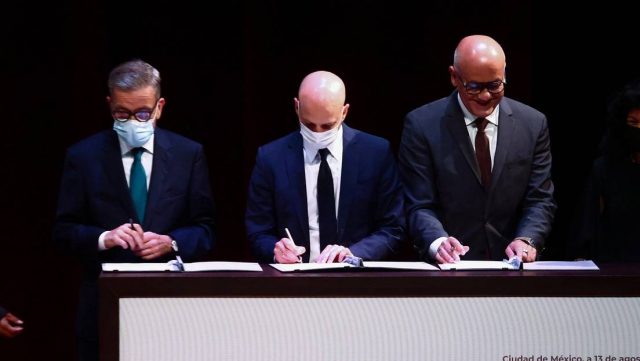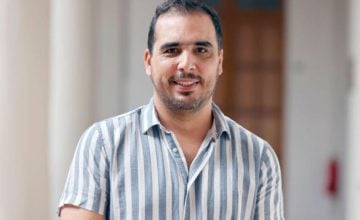Venezuela is experiencing a new political scenario since the Government and a radical sector of the opposition agreed to ease tensions and release Venezuelan State resources abroad, withheld by international banks as a result of unilateral coercive measures and the financial blockade imposed by the US, and the European Union (EU) against Caracas.
After signing the partial agreement in Mexico City a couple of weeks ago, which consists of injecting necessary funds to attend emergencies in areas such as health, education and public services in Venezuela, sanctions against the Venezuelan oil industry have also been made more flexible, explains RT.
As part of these agreements between the Executive and the opposition wing that promoted the sanctions package against their own country, notable progress in the dialogue resulted in the signing of new contracts between the State-owned Petróleos de Venezuela (PDVSA) and the US company Chevron, something unthinkable in recent years.
Contracts between PDVSA and Chevron
Since the US began to apply sanctions against the Venezuelan oil industry and its affiliated companies, more than a decade ago, the Venezuelan government has denounced that the coercive measures imposed on the country caused PDVSA to significantly reduce its production.
The fall in productivity was caused, in large part, by the impossibility of PDVSA to carry out adequate maintenance at its refineries, due to the fact that they could not access spare parts in the international market, as well as acquire additives to produce gasoline and other derivatives.
In parallel, the sanctions also had an impact on multinational companies that did business in Venezuela, which, as a result of the financial sanctions and the economic blockade against Caracas, were forced to paralyze their work, put an end to their activities or in the best scenario—to rely on limited authorizations from the US and the EU to operate in Venezuelan territory.
All this translated into an energy crisis that the South American country suffered for years, with shortages of fuel, domestic gas and vehicle lubricants, which forced Caracas to take urgent measures to address the emergency, including negotiating the import of gasoline from Iran, also sanctioned by Washington and Europe, and carry out maintenance on its refineries with Iranian experts.
However, as a result of the new contracts with Chevron that allow «the exploration, exploitation, refining, commercialization of crude oil and its derivatives» in Venezuela, issues such as the sale of Venezuelan oil in the international market, the internal supply of fuels and other activities related to the oil industry should change immediately, even if the sanctions against Caracas persist.
The agreements between PDVSA and Chevron are part of a «strategic partnership» and the presence of the US oil company in Venezuela extends to the development of four joint ventures, two in the state of Zulia and two in the Orinoco Oil Belt, where the largest crude oil reserves, in the world, are located.Dialogue with the other oppositions
After the signing of the agreement in Mexico, President Nicolás Maduro called for a dialogue with the other opposition factions, considered democratic for staying within the constitutional order during the political conflict with the «extremist» wing.
Maduro held a first meeting in Caracas, together with other governmental authorities and representatives of the Democratic Alliance, «in order to unify criteria that contribute to the economic and social growth of the country», reported the Venezuelan Communications Ministry .
That meeting was attended by representatives of the political parties Acción Democrática, Primero Venezuela, Cambiemos, Avanzada Progresista and Copei. The president of the National Assembly and head of the dialogue delegation on behalf of the Government, Jorge Rodríguez, explained that they discussed economic, social, political and electoral issues. In addition, he assured that in a maximum of 30 days they would present a joint document.
Juan Carlos Alvarado, general secretary of Copei, said that the meeting served «to identify the nation’s problems» and commit to achieving «a constitutional political pact» in favor of the population.
In the middle of this week, Maduro held another round of talks with representatives of the opposition Alianza del Lápiz political party. Jorge Rodríguez commented that this meeting helped to add ideas to attend to the political, social and economic panorama of the country.
For his part, the representative of Alianza del Lápiz, Antonio Ecarri, stressed that the «political opening» that is taking place is satisfactory, because – in his opinion – the country needs «special treatment» through «a popular, serious and transparent dialogue” that can give “quick and early responses” with three types of measures: urgent, important and transcendental.Venezuela awaits the agreed funds
At the moment, the Government of Venezuela is still waiting for the release of the more than 3,000 million dollars agreed with Mexico to provide «solutions to daily and urgent problems» for Venezuelans, said this week the Minister for Labor of Venezuela and a member of the governmental delegation for dialogue, Francisco Torrealba, in an interview with the local media outlet Globovisión.
«Now, what is necessary is to release the resources that are frozen to be used in the plans that the President of the Republic, Nicolás Maduro, has defined and that have been discussed with this sector of the opposition, which is part of the Unitary Platform», added. Torrealba.
Maduro has said that his government seeks the lifting of all sanctions imposed against Venezuela and the recovery of «between 24,000 and 30,000 million dollars» that are «kidnapped» abroad because those funds belong to his country.
A key point – Maduro highlighted – is the return of Venezuelan assets abroad, such as the CITGO oil refinery in the US, and the delivery of dividends generated during the years that this company has been intervened by the radical opposition and Washington support.
Maduro announced that, based on the retained resources, his government has drawn up a future investment plan for the country, set until the year 2030, so the repayment of these funds is vital to give dynamism to the economy and strengthen » to the maximum, the monetary exchange system and the value of the national currency”.











